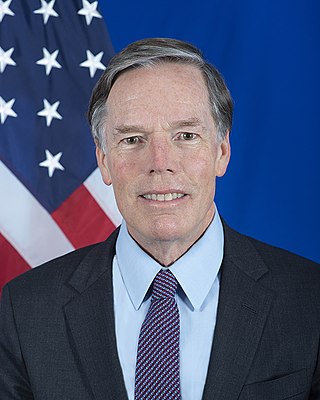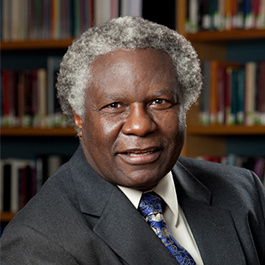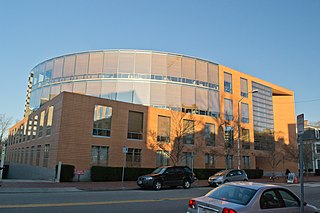
Joseph Samuel Nye Jr. is an American political scientist. He and Robert Keohane co-founded the international relations theory of neoliberalism, which they developed in their 1977 book Power and Interdependence. Together with Keohane, he developed the concepts of asymmetrical and complex interdependence. They also explored transnational relations and world politics in an edited volume in the 1970s. More recently, he pioneered the theory of soft power and explained the distinction between it and hard power. His notion of "smart power" became popular with the use of this phrase by members of the Clinton Administration and the Obama Administration.

Robert Bruce Zoellick is an American public official and lawyer who was the 11th president of the World Bank Group, a position he held from July 1, 2007 to June 30, 2012. He was previously a managing director of Goldman Sachs, United States Deputy Secretary of State and U.S. Trade Representative, from February 7, 2001 until February 22, 2005. Zoellick has been a senior fellow at Harvard's Belfer Center for Science and International Affairs since ending his term with the World Bank. He is currently a Senior Counselor at Brunswick Group.

Robert Nicholas Burns is an American diplomat and academic who serves as the United States ambassador to China since 2022.

Robert Owen Keohane is an American academic working within the fields of international relations and international political economy. Following the publication of his influential book After Hegemony (1984), he has become widely associated with the theory of neoliberal institutionalism in international relations, as well as transnational relations and world politics in international relations in the 1970s.

Calestous Juma was a Kenyan scientist and academic, specializing in sustainable development. He was named one of the most influential 100 Africans in 2012, 2013 and 2014 by the New African magazine. He was Professor of the Practice of International Development and Faculty Chair of the Innovation for Economic Development Executive Program at Harvard Kennedy School. Juma was Director of the School's Science, Technology and Globalization Project at Harvard Kennedy School as well as the Agricultural Innovation in Africa Project funded by the Bill and Melinda Gates Foundation. His last book, Innovation and Its Enemies: Why People Resist New Technologies, was published by Oxford University Press in 2016.
Helen V. Milner is an American political scientist and the B. C. Forbes Professor of Public Affairs at the Woodrow Wilson School of Public and International Affairs at Princeton University, where she is also the Director of the Niehaus Center for Globalization and Governance. She has written extensively on issues related to international political economy like international trade, the connections between domestic politics and foreign policy, globalization and regionalism, and the relationship between democracy and trade policy.

Marina von Neumann Whitman is an American economist, writer and former automobile executive. She is a professor of business administration and public policy at the University of Michigan's Ross School of Business as well as The Gerald R. Ford School of Public Policy.
Raymond F. Hopkins is an American political science professor and expert on food politics and food policy. Hopkins taught at Swarthmore College from 1967 until his retirement in 2007, where he was the Richter Professor of Political Science.
Robert Jeffrey Art is Christian A. Herter Professor of International Relations at Brandeis University, and Fellow at MIT Center for International Studies. He subscribes to the theory of neorealism, which argues that force still underlies the power structure in the modern world. He is a member of the Council on Foreign Relations, a United States nonprofit think tank specializing in U.S. foreign policy and international affairs.

Beth A. Simmons is an American academic and notable international relations scholar. She is the Andrea Mitchell University Professor in Law, Political Science and Business Ethics at the University of Pennsylvania Law School. She is a former Director of the Weatherhead Center for International Affairs at Harvard University and Clarence Dillon Professor of International Affairs at the Department of Government. Her research interests include international relations, political economy, international law, and international human rights law compliance.
Peggy Levitt is professor and chair of the sociology department at Wellesley College and an associate at Harvard University's Weatherhead Center for International Affairs and Hauser Center for Nonprofit Organization where she co-directs the Transnational Studies Initiative. Peggy writes regularly about globalization, arts and culture, immigration, and religion. Her latest book, Artifacts and Allegiances: How Museums Put the Nation on Display, is published by the University of California Press.

Kenneth Ian Juster is a veteran American diplomat, who served as the United States Ambassador to India from 2017 to 2021. He is currently Senior Counselor at the global law firm Freshfields Bruckhaus Deringer, Senior Adviser at the institutional investor CDPQ, Strategic Adviser at the software company Salesforce, and Distinguished Fellow at the Council on Foreign Relations.
Richard Gilmore is President/CEO of GIC Trade, Inc., an international agribusiness company with partner offices in Beijing, São Paulo, Quito, Moscow, and Tel Aviv. He is also Founder and Chairman of the Global Food Safety Forum (GFSF), a non-profit industry organization focused on educational and training activities in Asia with offices in the People's Republic of China (PRC) and Vietnam. A trade economist and businessman with a Ph.D. from the Graduate Institute of International Studies in Geneva, where he was a Fulbright Fellow, Gilmore served as Trustee for Bayer CropSciences, Syngenta Corporation, and Agrium, Inc. He is currently Trustee in the U.S. and Canada for Nutrien. He also served as Special External Advisor to the White House/USAID for the Private Sector/Global Food Security and Managing Director of the Global Food Safety Forum (GFSF) in Beijing. Gilmore developed two agro-carbon instruments: Commodity Plus Carbon (CPC)and GIC Ag Carbon Intensity Index.
Donald Paarlberg was a farmer, author, professor of agricultural economics, and a coordinator of the Food for Peace program.
Robert Richardson Bowie was an American diplomat and scholar.

In international politics, food power is the use of agriculture as a means of political control whereby one nation or group of nations offers or withholds commodities from another nation or group of nations in order to manipulate behavior. Its potential use as a weapon was recognised after OPEC’s earlier use of oil as a political weapon. Food has a major influence on political actions of a nation. In response to acts of food power, a nation usually acts in the interest of its citizens to provide food.

The Weatherhead Center for International Affairs (WCFIA), formerly Center for International Affairs (CFIA) is a research center for international affairs and the largest international research center within Harvard University’s Faculty of Arts and Sciences. It is sometimes referred to as the Harvard Center for International Affairs.

Andrew J. Nathan is a professor of political science at Columbia University. He specializes in Chinese politics, foreign policy, human rights and political culture. Nathan attended Harvard University, where he earned a B.A. in history, an M.A. in East Asian studies, and a Ph.D. in political science. He has taught at Columbia University since 1971, and currently serves as the chair of the steering committee for the Center for the Study of Human Rights. His previous appointments include as the chair of the Department of Political Science (2003–2006), and chair of the Weatherhead East Asian Institute (1991–1995).

Yasushi Watanabe He is a full professor at Keio University. He earned a Ph.D. in Social Anthropology at Harvard University in 1997 with a dissertation on "Nurturing A Context: The Logic of Individualism and the Negotiation of the Familial Sphere in the United States." After post-doctoral fellowships at Cambridge and Oxford Universities, he joined Keio University's Graduate School of Media and Governance as well as Faculty of Environment and Information Studies in 1999. He attained the rank of full professor in 2005, and is one of Japan's most prominent experts on cultural policy, public diplomacy, and American Studies.











